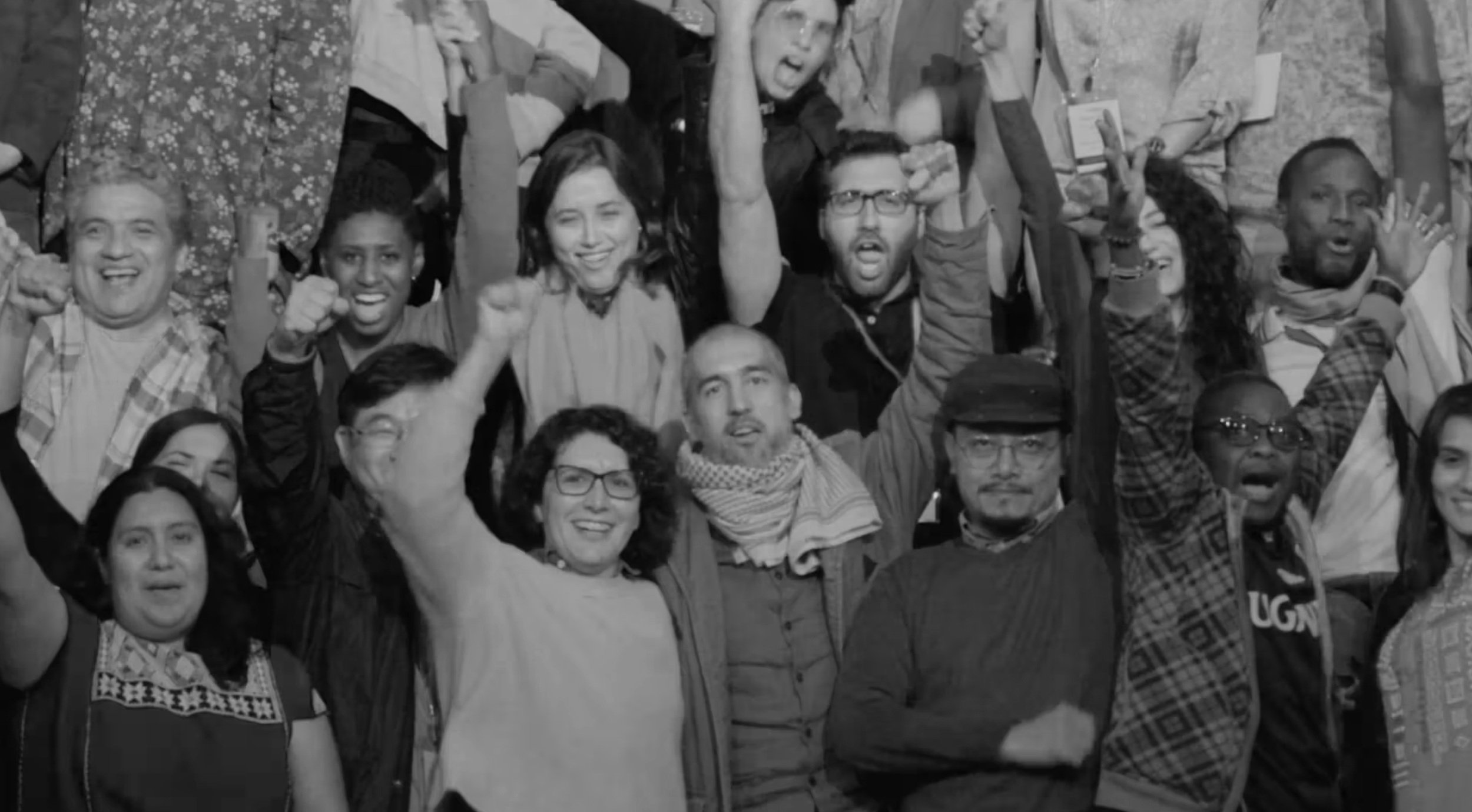
Global

MLL’s global work takes multiple forms: we host and steward the Global Network of Movement Lawyers (GNML) to organize lawyers globally; we develop channels to share global movement lawyering stories; and we bring the power of internationalism to US-based movements. Our core priority has been building out and coordinating the activities of the GNML, but we also leverage our positionality in US-based movements to bring internationalist perspectives to convening and learning spaces in the US and support our US partners’ international human rights advocacy.

What is the Global Network of Movement Lawyers?
The Global Network of Movement Lawyers (GNML) is rooted in the belief that movements confronting the present confluence of global crises need global legal strategies to accompany them. GNML grew out of a convening held in Morocco in 2019, where lawyers and activists from over 25 countries came together across more than five languages to strategize about how we might work together transnationally to confront the crises unfolding before us.
We are a network of movement lawyers across the world who work with organized communities and social movements fighting for human rights, self-determination and a healthy planet. Forged in a context of rising authoritarianism and the compounding crises of climate change, war, extreme economic inequality and, more recently, the COVID-19 pandemic, the GNML seeks to build a solidaristic and strong community of practice of movement lawyers globally who can address crises at the transnational level using innovative legal strategies that build the power of movements for social, economic, and environmental justice.
Movement Law Lab hosts and anchors the GNML. Our staff serves as the coordination team for the GNML in consultation with a Steering Committee made up of network members, with two staff members dedicated to building the infrastructure for members to connect and learn from one another and carry out advocacy campaigns on behalf of members at risk or on issues of transnational importance. The present moment of crisis has made it clear that opposing authoritarianism, decolonizing global systems and seeking a just transition need to be the primary frames through which we do our work. To that end, we are designing programming and legal strategies that respond to emerging opportunities to leverage our existing international legal mechanisms to the greatest extent possible while seeding the analysis and thinking for a system that works for people in a changing global climate.

What does the Global Network of Movement Lawyers do?
We connect the dots globally to devise innovative transnational advocacy actions.
For example, the GNML worked in close partnership with other networks to engage in a comprehensive campaign to unlock global access to COVID-19 vaccines and healthcare across multiple jurisdictions and forums in the global north and the global south. The advocacy advanced jurisprudence that named the legacies of colonialism and structural racial discrimination as the root causes of inequitable global access to medicines and disparate global health outcomes. Understanding the limitations of our international legal system’s ability to address the transnational dimension of the challenges facing our movements and communities, we design creative ways to push human rights mechanisms to deal with both structural causes of human rights violations and violations that take place across jurisdictions and borders.
We surface and disseminate community-driven movement lawyering innovations to resist repression and win change.
GNML is a platform for educating about models and leadership from the Global South. Most recently, our deep dives have been combining storytelling through case studies with facilitated exchange across languages to show how movement lawyers around the world are working to address issues including displacement, land dispossession, crackdowns on human rights defenders and criminalization of protest.
We mobilize rapidly to respond to threats to our members.
When network members are threatened, attacked, or arrested, we coordinate with their local colleagues and skilled, trusted threat assessors to determine whether and how NGO support and/or public attention can provide a protective response or increase the pressure to mitigate the threats. We recruit allies and support media advocacy to boost visibility and pressure officials. For example, see our coalition work in support of Vietnamese defender Dang Dinh Bach at www.standwithbach.org.

Adaptation in the face of a global pandemic
2020 brought us the COVID-19 pandemic, mass protests in the streets and heightening anxiety about climate catastrophe. Around the world, the coronavirus pandemic has led to job loss, income loss, and unsafe workplaces and living conditions that endanger the most vulnerable communities. Corporations are largely avoiding responsibility to the workers in their supply chains, and government relief programs are leaving out most migrant, informal, and contingent workers. The cascading impacts mean compounded precarity, such as lost work leading to housing evictions, and site closures leaving migrant workers without access to food, shelter, or transportation. In order to learn from one another and break our isolation, we held a series of calls around how the pandemic was impacting communities around the world, especially workers, and those experiencing food/water insecurity.

Webinar Series:
Tools for Our Safety and Protection
Community Security Measures and a Comprehensive Feminist Approach to Protection for Human Rights Defenders
A collaboration of the Economic, Social and Cultural Rights Project (ProDESC), the Global Network of Movement Lawyers (GNML) and the Oaxaca Consortium for Parliamentary Dialogue and Equity (Oaxaca Consortium)










